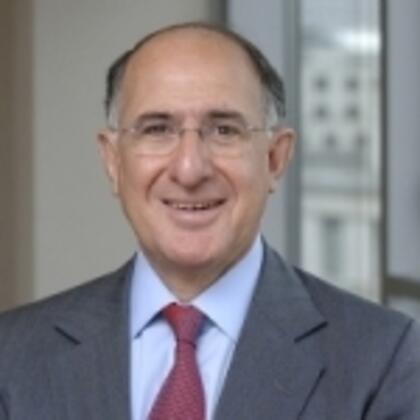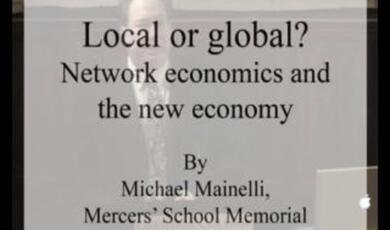Leadership at a Time of Transition and Turbulence - Lecture Two
Share
- Details
- Transcript
- Audio
- Downloads
- Extra Reading
In this lecture, which is the first of a two-part series, the Gresham Professor of Commerce Kenneth Costa hosts a conversation with distinguished leaders in business to examine the challenges of leadership at a time of financial and geo-political dislocation.
Download Transcript
Leadership at a Time of Transition and Turbulence: The Big Society
Professor Kenneth Costa,
Gresham Professor of Commerce
Gresham Lecture, Tuesday 11 January 2011
Good evening ladies and gentlemen. Welcome to my second lecture in this series, Leadership in a Time of Turbulence and Transition.
My last lecture advocated the leader as steward. Tonight I will argue that this kind of leadership is especially relevant to a very important topical debate: the Big Society.
I appreciate that the Big Society is something by which the government, and the Prime Minister personally, have set great store. In his Hugo Young lecture in 2009 David Cameron said:
“We need a thoughtful re-imagination of the role, as well as the size, of the state… actively helping to create the big society; directly agitating for, catalysing and galvanising social renewal.
“Our alternative to big government is not no government – some reheated version of ideological laissez-faire. Nor is it just smarter government. Our alternative to big government is the big society.”
I do not wish to make a party-political point. My view is that the Big Society transcends the normal left/right divide and is a very powerful idea in its own right. Indeed, it shows why that divide as conventionally conceived is increasingly outdated. It is therefore very pertinent to ask: What might the Big Society look like? What sort of leadership will fulfil the vision of the Big Society?
My brief answer is that the heart of the Big Society is the transition from an entitlement culture to an entrepreneurial culture. By entrepreneurial, I mean a host of intermediate organisations – public, private, mutually controlled – between the state and the individual citizen which offer locally and in communities services which an over-centralised state increasingly struggles to provide satisfactorily today. It re-energises society, arouses a fresh civic consciousnesses, and through involvement on a scale with which people can identify brings together the moral, spiritual and financial elements of what it means to be human.
It also promotes the country’s wellbeing. Easily caricatured as “happiness”, wellbeing is really about “wholeness’’, of society and individuals. Wellbeing, of course, is another idea which the government is pursuing, specifically to try to capture what gross domestic product, a monetary value construct, largely fails to measure.
The leader as steward manages the community’s resources for the long term in the interests of the whole community. His legitimacy derives from getting others to buy into his or her vision of the future, a vision which may be larger than themselves and even one they did not expect, and being seen to fulfil that vision in the interests of the whole community. In the Big Society this becomes a new model of a distributed, bottom-up leadership, using the tools of the digital age to reawaken the best of what lies often neglected within communities and stimulate a new breed of leaders.
This is new movement, a civil reawakening of grass-roots entrepreneurs, a real, radical social shift and not just another idea.
Origins of the Big Society
That is the undergraduate answer. Let me now attempt the postgraduate answer.
We need to understand why the idea of the Big Society has arisen. In the UK, and more generally across the western world, the post-war social settlement is losing effectiveness and support – a sign of the turbulent times which are the backdrop to this lecture series. The financial crisis, whose monstrous offspring is the euro crisis, has prompted anguished reflection on the limits of the conventional nation state in a globalised economy subject to systemic shocks.
Under the post-war settlement, typified in the UK by Lord Beveridge’s vision of a kind of enforced but liberal egalitarianism, famously set out in his book Full Employment in a Free Society, citizens cede relatively high taxation and a degree of personal liberty to the state. In return the state provides a wide range of services centrally and often without distinction between individuals – universal benefits. The autonomy of the nation state was taken for granted. In the 1940s the UK was beset by balance of payments and sterling crises, but it was assumed that government had the power to resolve them.
This managed welfare capitalism was based on the age-old lesson that economic success is built on strong social foundations – social cohesion, community, compassion in the sense of caring together, individual wellbeing. But it required an efficient, centralised and large state which commanded extensive resources and widespread support – a state which the UK had not fully seen before the exigencies of fighting Fascism made it essential and popular.
Managed welfare capitalism was attractive. It was certainly preferable to the misery of the inter-war period. For half a century it enjoyed success in reducing if not removing Beveridge’s five giants, as he called them: want, ignorance, disease, squalor and idleness. But in reality it was only feasible in a relatively small number of countries, mainly the advanced Anglo-Saxon and European democracies and Japan, where conditions encouraged this type of social intervention from above.
Today, however, the big state is increasingly less effective in meeting the social goals set out in the 1940s even in those countries where conditions most favour it. Without a fresh approach to building strong social foundations our economy will continue to disappoint, society will become more fractious and above all our humanity will be diminished.
We can see this in public services. Reform of public services has met with limited success. Despite heavy extra spending, for example, NHS productivity has fallen and educational achievement in the UK does not compare favourably with many of our international competitors.
Or take other, social, symptoms. Tax and benefits have become fiendishly complicated. Inequality has not significantly declined and may even be rising. Many feel the state has become too intrusive, for example by demanding DNA samples from the innocent. Despite the ancient presumption in law and custom that we can go freely about our business, the UK has more CCTV cameras than any country in the world save China. Over-centralisation has subjugated local initiative and community in an attempt to maintain a one-size-fits-all set of social interventions.
There are broadly three reasons for managed welfare capitalism running into these problems: economic, technological and social.
First, economic. The state now commands up to half of national income. As any business knows, scale brings the danger of diminishing returns. This is especially true of services – and the modern state is the biggest service provider of them all, in addition to its basic functions of protecting the realm and maintaining law and order.
Unfortunately, it is very hard to raise productivity in services. The problem is known to economists as Baumol’s Disease, after a seminal paper published in 1966 by William Baumol and William Bowen. Their argument was that service industries are hard to automate and standardise and by definition depend on the personal touch. At the same time, however, inflation means service workers expect their pay to go up in line with, and preferably ahead of, prices. Meeting the rising expectations of consumers, for example in the NHS, often involves hiring extra workers. In addition, the heavily unionised public sector workers in western welfare states understandably defend pay and employment stoutly.
The upshot is that money can be poured into public sector services only to go out largely in wages without corresponding improvement to the service, which amounts to a decline in productivity. The UK has seen exactly this phenomenon.
The second reason for the fading effectiveness of the centralised state is the digital revolution. Information was once the preserve of the few: Beveridge epitomised the high minded, very able, socially concerned expert who had the answer. But as Wikileaks has graphically illustrated, it has become much harder for the authorities to monopolise information. Indeed, citizens can legally access information on a scale hitherto barely dreamed of and do so legally. Now information is available to, and is increasingly the entitlement of, the many. They can challenge the state about detail and process, often with technologies which the state itself struggles to deploy effectively. That undermines and bypasses the top-down, centralised state.
Moreover, globalisation, in some respects the digital revolution’s handmaiden, is revolutionary in its merciless march through conventions and institutions, including the state. Globalisation is placing immense competitive pressures on western welfare capitalism. It is not too fanciful to ask: Can the welfare state survive Asian competition?
The third set of reasons for the erosion of the welfare state is social. Paradoxically, the upshot of the state’s well-intentioned attempt to provide for all is that in too many respects community interest has given way to individual interest. Far from cementing social solidarity, the welfare state has bred growing bands of free riders such as abusers of welfare and the tax system.
Transfer of too much authority to the centre has deprived once proud communities of dignity, identity and leadership. For example, it was common before the war for local authorities to issue their own bonds. Citizens bought them, not just because they were a safe investment but also because it was an expression of community solidarity.
For too many individuals, safety nets have become trampolines – dependency has replaced and subverted necessary and desirable support for the truly vulnerable. While the scale of dependency is sometimes exaggerated, a dependency culture deprives communities and individuals of dignity, responsibility and humanity.
As the state has faltered in its social promises, the west has seen a long-term decline in public confidence in politicians and officials because of their perceived inability to solve problems. In this country, anger over banker’s bonuses has its counterpart in the scandal of MPs’ expenses. Recent attitude surveys have indicated falling public support for welfare – a significant finding after half a century of robust support – and for the incumbent political leadership class generally.
Most significantly, there is a pervasive sense that the values which promote social cohesion and progress are lacking: compassion, responsibility, fairness, trust. The language is unfashionable, but there is a widespread feeling that we have lost a sure instinct for what is right and wrong. As I have argued in previous lectures, we have neglected that most basic of guides to conduct, the Golden Rule: “Do unto others as you would have done unto you”.
As a result, with honourable motives, we have allowed our humanity to become fractured. The financial, moral and spiritual have drifted apart. And our communities are correspondingly fractured. Despite the best efforts of official agencies, people are isolated, on some housing estates residents will only open the door to the postman, children suffer abuse.
All this is an affront to us as citizens and human beings. People are not meant to cope on their own. Aristotle famously said that “Man is a social animal”. He actually used the Greek word “politikos”, referring to the “polis” or city state. Generations of schoolboys, not to mention their masters, have rendered the translation literally as the more familiar “political animal”. But the word is actually more ambiguous and, taken in context, it seems Aristotle meant that we are social beings who thrive on contact, conversation and community.
Reawakening the spirit of community
Ladies and gentlemen, we cannot go on like this. For too long we have believed that we can keep hitting the snooze button – a reorganisation here, a benefit change there – and a fresh day will bring miraculous solutions. It will not.
I believe we must make the transition to a new form of government, a new way of meeting social and community objectives, a new contract between the state and citizens. We must reassemble the elements of our human essence. We have spiritual desires (longing for happiness) and a moral spirit (an instinct that doing well comes from doing right) as well as the financial imperatives which have been allowed to become the yardstick of our accomplishments.
Combining the moral, spiritual and financial into a revitalisjng, organic whole amounts to nothing less than a civic awakening. My vision is of a flatter, more distributed, lateral society in which a rich and dense network of intermediate organisations serves citizens independently of the state. Citizens will take more responsibility for themselves and for each other. Society as a whole will be strengthened.
This does not necessarily mean different social goals, for example reducing poverty. With or without the Big Society we face the same challenges – the environment, organising production, law and order, social morality. Nor does it necessarily imply spending less on achieving these goals. The point is that people will have much more scope to make choices about what services they want, how they are provided, and who runs them. They are likely to spend more of the total on these services; the state is likely to spend less.
I know that this vision begs huge questions. Will Whitehall really cede power? Where is the frontier between the state and non-state bodies? Most important perhaps, do people want the responsibilities the Big Society implies?
These questions must be addressed. But for our purposes this evening I would like to pick up the thread of leadership again. Who will be responsible and accountable in the Big Society?
It is useful to think of society as having three levels: citizens (including the individual and family) and neighbourhood groups; social, private and state providers of services; and government.
We have grown up with a system which essentially executes policy from the government down through mainly public providers of services to citizens. In the Big Society, the flow is somewhat reversed and – vitally – more interactive. That means the state voluntarily relinquishing powers to the intermediate bodies in my typology above. The supplicant becomes the supplier. In so doing he or she starts to fill the vacuum which has developed at the community level over the last decade or two.
Let me attempt to put some flesh on these bones. Myriad bodies can fill the space central government vacates: local councils, mutuals, schools, micro-finance, the proposed Big Society Bank, companies, affinity groups, faith bodies, volunteers – all sorts of organisations from which citizens and communities are willing to order services.
Very often these will be affinity groups – people with common interests or a community agenda which they wish to further through their own organisations or others they contract to do the job. New organisations will doubtless spring up but the inspiration and history are lodged in our folk memory already. We do not have to invent the wheel. It already exists, to take two cases, in the shape of the Women’s Institute, founded in the UK in 1915, and the cooperative movement (of which more in a moment). We are all familiar with the army of charities and associations which vie for our support, hard evidence that there are foundations on which to build.
People old and young can find new outlets for their skills. How to tap the vast talents and experience of older people, and help ease the pensions crisis, is a pressing concern today. Most of us can expect longer and healthier lives than at any time in history. But the old remain a largely neglected resource. The legion of retired professionals – accountants, vicars, doctors, service personnel, lawyers and so on – is a massive pool of expertise, as is the population in general.
But it is even more important that younger people re-discover the value of being more connected with their communities. What better than Generation Y – the digital generation born between the 1970s and the end of the last century – committing its prodigious energy and talent to the sort of society it wants for the future? The popularity of charitable gap years for university students, competition for jobs with NGOs, and the spare time young professionals devote to good causes – all give the lie to the charge that younger people do not care. What better therefore than combining the energy of the young and the experience of the old in a community of interest?
Nor are physical resources hard to find. Buildings such as churches and schools can be a roof over the heads of community groups. Let’s be bold and rip out the pews in sadly deserted churches and make the spaces available to a new breed of community entrepreneurs. And why should not citizens meet in their own homes? As the King James Bible proclaimed four centuries ago: “Charity never faileth.”
All this sets up competition between suppliers – competition which is local and directly engaged, competition between commercial suppliers, voluntary suppliers and intermediate groups such as professional not-for-profit charities. There will be no Big Society without robust entrepreneurship, which can also strengthen the country’s economic recovery in the short term and underpin its competitiveness in the long term.
In short, the Big Society releases the Little Platoons.
The Big Society bank
Supporting the Little Platoons, however, will be a bigger battalion: the Big Society bank. I cannot emphasise the importance of this institution too much. The bank can be the spearhead of a new twenty-first century citizens’ movement which, through welding capital to local knowledge and expertise, stimulates the financial grass roots. It will be critical to providing citizens’ groups with the financial wherewithal to fulfil their community ambitions. Its point is to be an umbrella energiser for volunteers and entrepreneurs starting small businesses and organisations to serve their communities This will be community-inspired capitalism which will help in the much-needed rehabilitation of the very notion of a bank.
Localism, entrepreneurship and a new business model will distinguish the movement. With help from the bank, community groups will be able to get together to provide cost-effective services such as care for the elderly and – this is fundamental – share in the returns. The bank can draw on microfinance to show that finance can serve communities in palpable ways, harnessing local entrepreneurs to meet local needs identified by local people.
This bottom-up financial model will create new spaces in which the best instincts of individuals frustrated by an over-centralised state can find expression to help each other and flourish together. With finance from the bank, we can harness the energy of the young and the experience of the old, tapping into a rich vein of talent for which there are too few outlets now.
To realise these ambitions, the Big Society bank must have several defining characteristics. First, it has to be fully independent of the state. The bank cannot plausibly help to fund community organisations intended to take over state functions if it is tied to the central government bureaucracy. The bank’s founding charter ought therefore to declare its independence, and its legal form should embody that independence.
Second, the bank has to be profitable – but without aping conventional finance. Funding robustly entrepreneurial alternatives to state provision of services, whether through social entrepreneurs or conventionally commercial bodies, distinguishes it from normal for-profit lenders. But a reasonable return on lending is essential. The bank symbolises a grass-roots capitalism which recognises that making money is a moral imperative and so sets an example of prudent conduct to other Big Society organisations. Substituting waste by the little platoons for waste by the big state can hardly be deemed progress.
Third, the bank should be pivotal to the connected green and digital revolutions at the local level. It could, for example, offer a platform on which communities can bid for and offer funds. Communities can now command a degree of detail which until recently was the preserve of the central state and one of the justifications for top-down, command and control service provision. By contrast, the Big Society thrives on a much greater interaction of information and influence between the state, intermediate organisations and individual citizens.
And fourth, the bank must be established for the long term. The Big Society is a transformational project, no less than was the emergence of the welfare state in the middle of the last century. Like the welfare state, it will require broad and lasting political support to mature. The bank must not be allowed to suffer the fate of other socially-minded financial initiatives and fade away or lose its identity.
A concordat between the high street banks and the government would greatly help to secure the Big Society bank’s position. The intention has been to launch the bank with capital from dormant high street bank deposits and contributions from the banks themselves. Agreement has proved elusive, but the amount of funding which the banks will inject into the new bank should be part of an overall settlement on the regulatory regime and would be a visible sign of the financial system’s willingness to use bank capital in a socially constructive fashion. In the wake of the financial crisis and public disillusionment with the City it would demonstrate that capitalism can reconnect with its moral moorings.
This is far from being a purely instrumental matter. For there are three types of advantages to devolving power: financial, spiritual and moral.
The financial advantages include shorter lines of communication, better knowledge of the community (which may be a locality or common interest group), more immediate accountability, competition which can cut costs. The result is superior services from entrepreneurs who communities know and trust.
The spiritual advantages include community cohesion, sharing, the joy of giving, greater fulfilment and more rounded lives individually and communally. Thus a retired NHS employee who helps to meet a community need, for example mental health, whether paid or unpaid, benefits personally and benefits the community.
A growing body of modern research supports Aristotle’s description of humans, showing that people individually and collectively are more content when they cooperate with each other than if, as the standard economic model has it, we are each treated as agents struggling to maximise our individual gains. Here is a telling clue to the essence of wellbeing.
The moral advantages are in strengthening the attenuated link between rights and responsibilities and so creating the opportunity for a new kind of citizenship. In the language of political philosophy, the Big Society is a new contract between the state and citizens, between what citizens receive and what they give, and their expectations of receiving and giving.
The essence of the contract is that the state steps back so citizens can provide for themselves the services they want in the way they want. But the right to choose must be tempered by the responsibility to choose wisely. Community without responsibility easily degenerates into the tyranny of structurelessness. What I have in mind is neither the command and control society artfully disguised nor genteel anarchy.
New model of leadership
Put another way, leadership has not been abolished. Quite the contrary. The whole point is to unleash the talents which can forge a new type of leadership, to fill the vacuum created as power has drained away from communities to the centre sweeping along with it ancient instincts of solidarity and mutual support.
All this spells the end of the top-down model of leadership which pervades society, from government to companies. Top-down leadership is a symptom and cause of the emerging weaknesses of the managed welfare capitalism, to which I referred earlier.
Top-down leadership has raised expectations excessively over a long period, thereby sowing the seeds of its own decay. It has encouraged a narrowly materialist view of what it is to be human, resting on frequently dubious cost-benefit analyses to form policy and failing to ask basic questions about what is right and what is wrong. That in turn has stretched the link between rights and responsibilities almost to breaking point.
Evident though the failings of top-down leadership have become, we have barely begun to consider what kind of leadership will work in the new world whose outlines we are beginning to glimpse like seafarers stumbling upon an undiscovered continent as dawn breaks.
In my previous lecture I described the future leader as a steward. The steward leader owes his position to the legitimacy followers confer on him because he manages resources in the long-term interests of the whole group. He is also able to get a group to achieve an objective which they did not think they could reach or even knew they wanted to reach by setting out a compelling narrative.
Such leaders have a vision, but they understand how to get people to buy into that vision so followers, who ultimately determine whether leader really leads, can be part of something which is bigger than themselves. The twist here is that the steward leader may be found in all walks of life, not least because the smaller the social unit the more unsuitable is command and control. Modern thinking tends to play down the importance of innate traits such as intelligence, emotional stability, conscientiousness and tough-mindedness and suggests that luck, timing and circumstances play a big part in successful leadership.
This is important for the Big Society. At the beginning of this lecture I defined the new model of leadership as “distributed”. By that I did not simply mean that there will be many different foci of leadership instead of the more or less unitary focus of power we have at the moment. I also meant that leaders will come from all walks of life, no doubt in unexpected ways and from unexpected places. We can expect new career paths to supplant or at least supplement the well-worn route through local government to quango and central government.
Lest I seem unduly idealistic, we should remember that something like this has happened before. In 1844 a group of 28 weavers and artisans in Rochdale, then a leading Lancashire mill town, decided they were fed up with excessive prices being charged for food and other daily necessities in shops often owned by their employees. They set up the Rochdale Society of Equitable Entrepreneurs, the prototype cooperative, and launched a movement which continues to this day.
The Rochdale Pioneers were ordinary people who took responsibility into their hands. They integrated their families’ interests with those of a wider community, first the town and later the whole country. But equally important to their success was the business-like nature of the enterprise. They sold unadulterated goods at fair prices and introduced the patronage dividend, the “divi” as it became known to generations of coop members and customers. Membership of the society was not an idle responsibility. Active members – those who spent money in the shops – were rewarded with the divi.
The birth of the cooperative movement furnishes us with another relevant lesson. By definition a cooperative implies group rather than individual leadership. I am not advocating cooperative leadership as the panacea, but in today’s world digital technology, education and social awareness mean that a new and successful group – a local education provider perhaps – is itself a form of leadership. The empowered group is a leader.
In the mid-nineteenth century this new type of leadership and community self-help was unexpected, innovative and to some minds a disturbance of the established order. Leadership in the Big Society will involve more disturbance – although I hope that it will enjoy a wider welcome this time. For a defining feature of the new leadership model is what I call “creative messiness”. By this I mean the absence of uniformity, of one-size-fits-all solutions and the presence of a much more diverse and representative cohort of leaders, especially at the community level.
The consequences may be uncomfortable and it may take a while for people to adapt to them. For example, if decisions are decentralised to health services locally we must accept that provision will not be identical all over the country. Citizens will have to accept that local variations in health care are the result of their expressed local choice and not just a “post code lottery”. The unevenness between communities in the provision of truly local services – as distinct from local variations on a national theme such as the NHS – might be even greater. Some experiments will fail and others disappoint. There will of course be successes too – many successes I believe – but leadership of any sort is tested by adversity rather than success.
Conclusion: Civic reawakening
It is clear therefore that the new leaders will have to deal with the richness of the social fabric which will develop as the Big Society takes root. Decentralisation, local empowerment, new or revived social intermediaries, a greater sense of personal and civic responsibility, a different kind of leadership – these are undoubtedly big changes.
But the prize is re-humanising society. The outstanding lesson from the financial crisis, as I have argued before, is that for too long we have suffered a sundering of the financial, spiritual and moral elements of our being. We allowed the financial to trump the moral and spiritual. In the simplest terms, we lost sight of right and wrong.
Like Humpty Dumpty we have had a great fall and fragmented, as individual humans and as communities. But whereas the King’s men in the nursery rhyme failed to put Humpty Dumpty back together again, we must succeed. Humanity must be reconnected with itself.
There can be no greater task for leadership. Let me suggest three practical measures to nurture the new model of distributed leadership:
Found a Leadership Training programme to equip communities with the skills and confidence to take over from central government, perhaps under the aegis of the Big Society bank. After all, at the risk of sounding patronising, communities have become like individuals who have lost the power of a certain muscle through inactivity – the capacity is there but it needs re-building. Devolution of power will not succeed without the necessary personal as well as financial capacity.
Each financing by the Big Society bank should include a component for local capacity building, at least in the early stages of the organisations being funded. Uses of the capacity building component could include training leaders and their staff and recruitment.
Communities should set up an electronic Leadership Forum to exchange experiences and find leaders. Communities could draw on existing local expertise, say in universities and further education colleges, to manage this and other aspects of their digital business.
Ladies and gentlemen, what is required in this era of turbulence and transition is a new civic awakening, a new movement based on affinity groups, locally empowered, which are accountable to the community and inspire their own leadership. We need to re-discover the potential richness and depth of civic awareness and action which lies within each and every one of us.
We still stand on the edge of the largely unknown territory of the digital age. But the outlines of what lies ahead are visible. A flatter society, in which citizens are economically active providers for their own needs and create their own leadership. This is not just an idea. It is nothing less than a transformation in how we think and act. It is a call to action which demands change at the grass roots, action to forge a very different future.
Greater personal and community involvement rebalances rights and responsibilities. It clears the air for fresh intellectual, social and spiritual influences. It is a big step towards reintegrating the financial, moral and spiritual in our lives individually and together. It is the basis for emphasising wellbeing instead of national income as the yardstick of progress.
If sounds like an ambitious sketch for a twenty-first century Beveridge, that’s because it is – and because I believe it to be a pressing necessity. I am also acutely aware that so momentous a transition from individual to community will almost certainly take decades – just as the roots of the 1945 welfare state stretched back for at least half a century
So, to conclude, it is all the more important that we nurture the right kind of leadership for us to make the transition from turbulence and towards a new reality of how citizens can take more control over their lives and communities.
Thank you very much.
© Professor Kenneth Costa, Gresham College 2011
This event was on Tue, 11 Jan 2011
Support Gresham
Gresham College has offered an outstanding education to the public free of charge for over 400 years. Today, Gresham plays an important role in fostering a love of learning and a greater understanding of ourselves and the world around us. Your donation will help to widen our reach and to broaden our audience, allowing more people to benefit from a high-quality education from some of the brightest minds.


 Login
Login







